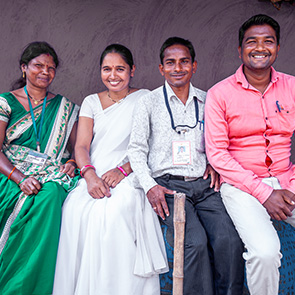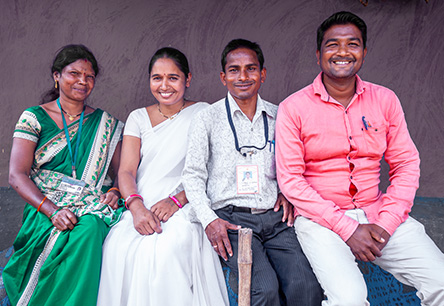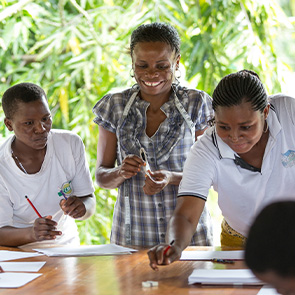Our Pharmaceutical R&D organization advances our purpose to change the trajectory of health for humanity by pursuing breakthroughs across a wide range of therapeutic areas and biological pathways, applying our expertise in small molecules, monoclonal antibodies, cell and gene therapies and RNA therapeutics.
We delivered numerous recent achievements across several therapeutic areas in 2022.
John Reed M.D., Ph.D.
Executive Vice President, Pharmaceuticals, R&D
Oncology
In line with our strategy to address unique cellular targets through immunotherapy treatment regimens, and our deep expertise in multiple myeloma, we realized breakthrough developments in multiple myeloma therapies in 2022, addressing high unmet need to profoundly impact the lives of patients living with this form of cancer.
- EU and FDA approval of CARVYKTI (ciltacabtagene autoleucel) was granted for the treatment of adults with relapsed or refractory multiple myeloma after four or more prior lines of therapy, including a proteasome inhibitor, an immunomodulatory agent and an anti-CD38 monoclonal antibody. CARVYKTI is a chimeric antigen receptor T-cell (CAR-T) therapy that works by harnessing the patient’s own immune system, or T-cells, to attack cancer cells.
- EU and FDA approvals of TECVAYLI (teclistamab), a novel, first-in-class, T-cell redirecting bispecific antibody that activates the body’s immune system to fight cancer, were granted for the treatment of patients with relapsed/refractory multiple myeloma. These milestones marked significant developments for heavily pre-treated patients who have limited treatment options today.
Yusri Elsayed M.D., M.H. Sc., Ph.D.
Vice President, Hematologic Malignancies Disease Area Leader, Janssen R&D
- FDA breakthrough therapy designation was granted for talquetamab, a first-in-class bispecific antibody for the treatment of heavily pretreated patients living with multiple myeloma.
Further advances in treating leukemia were also achieved in 2022, with two significant approvals for IMBRUVICA (ibrutinib):
- EU marketing authorization was granted for the expanded use of our IMBRUVICA (ibrutinib) in a fixed-duration combination regimen for adults with previously untreated chronic lymphocytic leukemia. This marks the first-ever approval of IMBRUVICA in a fixed-duration regimen for patients with this form of cancer.
- FDA approval for IMBRUVICA (ibrutinib) was granted as the first and only treatment for children under 12 with chronic graft-versus-host disease (cGVHD), a life-threatening complication that can occur after a stem cell or bone marrow transplant, when newly transplanted donor cells attack the transplant recipient’s body. Transplant is sometimes used to treat children with hemoglobin problems such as sickle cell anemia or thalassemia and for children suffering from leukemia.
Additionally, Johnson & Johnson Innovation entered into new collaborations to advance research in specialist oncology fields:
- Seeking new cancer treatments: Janssen Oncology and Hangzhou DAC Biotechnology, a discovery and clinical stage biotechnology company, formed a research collaboration and license agreement with an aim to discover and develop novel antibody drug conjugate candidates for up to five targets using DAC Biotechnology’s expertise and innovative platform combined with Janssen Oncology’s proprietary antibodies. This research collaboration will focus on prostate cancer, hematologic malignancies and solid tumor targeted therapy to help maximize the impact of early stage research to meet the significant unmet need in cancer-related healthcare challenges.
- Optimizing CAR cell treatment: Janssen Biotech formed a research collaboration with Serotiny, a gene and cell therapy development company, to leverage Serotiny’s multi-protein domain discovery platform and Janssen’s antibody development and cell therapy expertise to create next-generation CAR-based cell therapies. This collaboration has the potential to advance scientific innovation to develop next-generation cellular therapies with improved therapeutic function and enhanced clinical benefit that could positively impact the lives of patients and families.
Immunology
We seek to redefine the standard of care for people living with immune-mediated diseases by focusing on unmet patient need and actionable science. Two key products for the autoimmune community, STELARA (ustekinumab) and TREMFYA (guselkumab), made progress in 2022:
- STELARA received FDA approval for treatment of pediatric patients aged six years and older with active psoriatic arthritis (PsA).
- TREMFYA celebrated its five-year milestone of the approval of this treatment for moderate to severe psoriasis. In 2022, Janssen published a comprehensive analysis, demonstrating that TREMFYA ranked highest among all approved therapies for skin clearance in the treatment of PsA.
We advanced critical research in immune-mediated inflammatory diseases (IMID) such as Crohn’s disease, ulcerative colitis (UC) and PsA. We progressed our work studying oral cytokine inhibitors as a new form of treatment for people living with IMIDs with a Phase 2b trial for the treatment of moderate to severe plaque psoriasis. What’s more, our investigational novel combination therapy of guselkumab (IL-23) and golimumab (TNF) also showed promising results for the treatment of UC.
Katie Abouzahr M.D.
Vice President, Portfolio Development Leader, Autoantibody, Janssen R&D
Building on our legacy of leadership in immunology innovation, Janssen is investigating a targeted treatment, nipocalimab, to address the underlying cause of antibody-driven disease. Nipocalimab is being investigated in maternal fetal diseases, rare diseases and prevalent rheumatologic diseases, where unmet need is high and, in some cases, no therapy is currently available.
Neuroscience
Janssen intends to reconceptualize the diagnosis and treatment of nervous system disorders with the aim to reduce the burden and disability experienced by patients worldwide. Researchers at Janssen are pioneering multiple approaches in neuroscience to reduce the disability caused by serious neuropsychiatric, neurodegenerative and central nervous system autoantibody diseases while extending scientific advances in precision medicine:
Alzheimer’s disease (AD)
We are leading the way to revolutionize AD with a differentiated tau portfolio that employs the latest advancements in precision medicine, data science and digital health to use unique biomarkers to speed earlier diagnosis, drug development and decision making.
Our biomarker team developed and is evaluating a blood test to predict central amyloid positivity and tau status—indicators of AD—with high accuracy. We are also developing novel digital biomarkers in collaboration with leading technology firms. For example, together with ki:elements, we are piloting speech biomarker technology using AI and machine learning to identify abnormalities in speech patterns that may be predictive of early disease.
Depression
Our neuroscience team is leading the charge against the most serious forms of depression, a mental health condition that places a heavy burden on society, affecting millions of patients worldwide. We launched the first new mechanism in decades, SPRAVATO (esketamine) CIII nasal spray, for use in conjunction with an oral antidepressant in March 2019 for adults with treatment resistant depression, and in August 2020 for depressive symptoms in adults with major depressive disorder (MDD) with acute suicidal ideation or behavior. In addition, Janssen is advancing drug candidates with novel mechanisms of action for depression, including aticaprant and seltorexant. Altogether, these efforts aim to provide patients with more potential options for combating depression.
Myasthenia gravis (MG)
This is a highly debilitating, rare autoantibody disease for which there currently is no cure and which can be difficult to diagnose. We are investigating nipocalimab to address a range of serious autoantibody-mediated diseases, including MG. Results from our Phase 2 study with nipocalimab in patients with generalized myasthenia gravis (gMG) showed a rapid, robust and sustained clinical response over placebo. The Phase 3 trial in adults and Phase 2 study in children are underway.
Cardiovascular, Metabolism & Retina
The Cardiovascular, Metabolism & Retina therapeutic area covers some of the most common causes of death, such as cardiovascular disease, and many other life-threatening conditions that significantly impact overall health, including chronic kidney disease and retinal diseases.
In 2022, we announced the results of our Phase 2 AXIOMATIC-Secondary Stroke Prevention study of milvexian, a novel oral anitcoagulant, which enrolled more than 2,000 patients with a primary ischemic stroke. Early stroke recurrence after ischemic stroke remains a significant risk despite advances in secondary prevention. The data from the AXIOMATIC-Secondary Stroke Prevention study showed an approximate 30% relative risk reduction in recurrent symptomatic ischemic strokes and a favorable safety profile in three arms of the study compared to placebo. This suggests that milvexian has potential to improve outcomes for stroke patients in clinical practice. These results, along with findings from the AXIOMATIC-TKR study, set the stage for our comprehensive Phase 3 program.
We also received encouraging results from a Phase 1/2 study evaluating investigational gene therapy botaretigene sparoparvovec for the treatment of X-linked retinitis pigmentosa (XLRP), a rare condition that causes progressive vision loss, starting in childhood with night blindness and leading to legal blindness by middle age. Using gene therapy approaches we are also advancing candidate therapeutics for common ocular diseases, including geographic atrophy.








